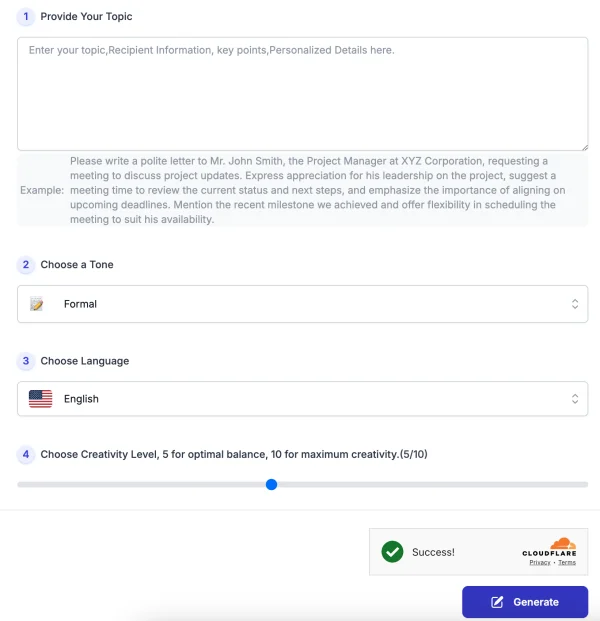Unlock Insights: Find the Answers You Seek on Our Blog
How to Write a Character Letter for Court: A Step-by-Step Guide
By Evelyn Sterling
A character letter is a personal statement written to the court by someone who knows the defendant well. The purpose of this letter is to provide the judge with a broader understanding of the defendant’s character beyond the legal aspects of the case. It serves to present a well-rounded view of the individual, emphasizing their positive attributes, moral values, and contributions to family, work, or the community.
The importance of a well-crafted letter cannot be overstated. A carefully written character letter can influence the court’s perception of the defendant and potentially affect the outcome of sentencing or other decisions. A poorly written or unorganized letter, on the other hand, may come across as insincere or unhelpful. By presenting a clear, respectful, and thoughtful message, the letter can humanize the defendant and highlight their redeeming qualities, which may be important when the court weighs decisions related to punishment or leniency.
Purpose of a Character Letter in Court Proceedings
The primary purpose of a character letter in court is to provide the judge with insights into the defendant’s personality, morals, and behavior that are not included in legal documents. These letters are typically written by friends, family members, colleagues, or community leaders who can vouch for the defendant’s character. The goal is to present the defendant as a person beyond the criminal charges, offering context about their life and the positive impact they have on those around them.
In some cases, a well-written character letter may influence the judge’s decision on sentencing, bail, or other legal outcomes. It can serve as a plea for leniency, demonstrating that the defendant has support from the community and is capable of reform.
Importance of Presenting a Well-Crafted Letter
A well-crafted character letter can have a significant impact on court proceedings. It is crucial to be thoughtful, respectful, and concise when writing this letter. A well-organized letter shows the judge that the writer has carefully considered their words, and it allows the court to easily follow the points being made.
A poorly written or overly emotional letter may lack credibility or fail to serve its intended purpose. Therefore, it is important to:
- Maintain a formal tone.
- Be honest and sincere.
- Focus on specific examples of the defendant’s good character and positive behavior.
By ensuring the letter is professionally written and free of errors, it maximizes the chances of positively influencing the court’s decision.
Understanding the Role of a Character Letter
A character letter serves as an opportunity to present a more comprehensive view of the defendant beyond the legal charges they face. It highlights their virtues, personal qualities, and contributions to society, which may not be apparent through legal documents alone. By sharing personal experiences and anecdotes, the letter offers the judge a chance to consider the defendant’s background, relationships, and reputation, all of which can be important when determining sentencing or other court decisions.
How Character Letters Can Influence Sentencing or Judgments
Character letters can play a pivotal role in influencing sentencing or judgments by:
- Humanizing the defendant: Courts often deal with legal facts and charges, but a character letter shows the defendant’s personal side, including their kindness, work ethic, or positive contributions to their family and community.
- Demonstrating community support: When multiple individuals come forward to vouch for the defendant, it reinforces the idea that the defendant is valued and respected, which could sway a judge toward leniency.
- Encouraging leniency: In cases where the defendant shows remorse, character letters can demonstrate that they have the support and potential to reform, which may influence the court to consider a more lenient sentence.
Legal Considerations and Limitations
While character letters can provide valuable insights into the defendant’s personality, there are important legal considerations and limitations to keep in mind:
- Avoid legal arguments: The role of the character letter is not to dispute the charges or question the legal system. Legal defenses and arguments should be handled by the defense attorney, so the letter should focus on the defendant’s personal character and qualities.
- Acknowledge the offense: If appropriate, the letter should acknowledge the offense without making excuses or downplaying the seriousness of the situation. This shows the judge that the writer respects the legal process while still supporting the defendant.
- Stay truthful: Exaggerating or making false statements in a character letter can backfire, damaging the defendant’s case. Judges are skilled at identifying insincerity, so it’s crucial to remain honest and provide an accurate portrayal of the defendant.
- No criticism of the victim or legal system: Criticizing the victim or questioning the legal process will only weaken the letter and could harm the defendant’s chances. Keep the tone respectful and focused solely on the defendant’s character.
Understanding these limitations ensures that the letter serves its intended purpose—supporting the defendant’s case without overstepping legal boundaries.
Before You Begin Writing
Before drafting a character letter for court, it’s essential to prepare by gathering the right information and ensuring that your relationship with the defendant is clearly understood by the judge. This preparation will help you create a letter that is accurate, relevant, and meaningful in the context of the case.
Confirming Your Relationship with the Defendant
One of the first steps in writing a character letter is to establish your relationship with the defendant. Judges need to understand why your perspective is valuable and how well you know the individual. Be clear about:
- How long you have known the defendant.
- In what capacity you know them (friend, family member, co-worker, community leader, etc.).
- The nature of your relationship, emphasizing your personal experience and insights into their character.
The closer and more genuine your relationship, the more weight your letter will carry in the eyes of the court. Make sure to focus on aspects of the defendant’s life that you’ve personally observed.
Gathering Relevant Information About the Case
Before you begin writing, it’s important to understand the context of the case. Without detailed knowledge, your letter may seem out of touch or irrelevant. Consider gathering the following:
- Details of the charges: Know what the defendant is accused of, and be aware of any relevant legal proceedings or facts related to the case.
- The impact of the potential sentence: If you are aware of how the sentence may affect the defendant’s life, family, or work, you can make a stronger case for leniency or consideration.
- Any personal history that may provide context, such as past positive behavior or a clean record before this incident.
Having a basic understanding of the case will allow you to address the situation in an informed way while keeping the focus on the defendant’s character.
Consulting with the Defendant’s Attorney if Necessary
In some cases, it may be beneficial to consult with the defendant’s attorney before writing your letter. The attorney can provide guidance on:
- What points to emphasize based on the court’s expectations and the specific circumstances of the case.
- Any legal limitations or sensitive areas to avoid that may unintentionally harm the defendant’s case.
- Specific information that may strengthen the letter’s relevance, such as highlighting certain character traits or providing examples that resonate with the court.
Working with the defendant’s legal team ensures that your letter aligns with their overall defense strategy and remains focused on supporting the case without unintentionally undermining it.

Formatting the Letter
Formatting a character letter for court is crucial to ensuring that the letter is professional and taken seriously. A well-formatted letter reflects your respect for the court and the gravity of the situation. Below are the key elements to include when formatting the letter.
Proper Letterhead and Contact Information
At the top of the letter, you should include your full name, address, phone number, and email address. This information allows the court to know who you are and how they can contact you if needed. Proper letterhead and contact information should be formatted as follows:
- Your full name
- Your address
- City, state, and ZIP code
- Phone number
- Email address
Directly below this, add the date the letter is being written.
After this, include the court’s contact information:
- Judge’s full name
- Court name (e.g., Superior Court of [County])
- Court address
- City, state, and ZIP code
This ensures that the letter is addressed to the correct individual and court, demonstrating professionalism.
Appropriate Salutation to the Judge
The salutation should be respectful and formal. Address the judge using the following format:
- Dear Judge [Last Name]:
If you don’t know the judge’s name, a more general salutation is acceptable, such as:
- To the Honorable Judge of [Court Name]:
Avoid informal or casual greetings, as this is a formal legal document.
Formal Tone and Language
Throughout the letter, it is essential to maintain a formal tone. The court will expect a serious, respectful, and well-organized letter. Here are some tips to ensure your tone and language are appropriate:
- Use professional language: Avoid slang, casual phrases, or overly emotional expressions.
- Keep the tone respectful: While you may be advocating for the defendant, the letter should show deference to the court and the legal process.
- Be concise: Stick to the facts and relevant personal experiences. Avoid unnecessary details that may detract from the purpose of the letter.
Example of a formal opening:
“My name is [Your Full Name], and I am writing to provide a character reference for [Defendant’s Name], whom I have known for [X years].”
By maintaining a formal tone and structure, your letter will be clear, professional, and more likely to make a positive impact on the judge.
Content of the Letter
The content of your character letter is the heart of the message and needs to be clear, specific, and personal. It should offer insights into the defendant’s character that the court may not otherwise know, while remaining professional and respectful. The letter typically follows a straightforward structure, beginning with an introduction, followed by body paragraphs, and concluding with a summary and respectful request.
Introduction
In the introduction, you should clearly state who you are, your occupation, and your relationship to the defendant. This helps establish your credibility and gives the court context for your perspective. Additionally, you should mention how long you’ve known the defendant, as the length of your relationship can indicate the depth of your understanding of their character.
Example:
My name is [Your Full Name], and I am currently employed as a [Your Occupation]. I have known [Defendant’s Name] for the past [X years] as a close friend/colleague/family member. Over this time, I have come to know [Defendant’s Name] very well, both personally and professionally, and I believe my insights into their character can provide valuable context for your consideration.
This introduction lays the foundation for why your letter should carry weight in the court’s evaluation.
Body Paragraphs
In the body of the letter, you should provide specific examples of the defendant’s positive character traits. This section should focus on painting a well-rounded picture of the individual’s values, work ethic, and moral compass, backed up with real-life anecdotes. When possible, you should highlight contributions to their family, work, or community to demonstrate their integrity and positive impact on others.
Specific Examples of the Defendant’s Good Character Traits
In the years I have known [Defendant’s Name], they have consistently demonstrated [list specific traits such as honesty, responsibility, kindness, or dedication]. For example, [specific example illustrating these traits].
Anecdotes Illustrating Positive Behavior
Provide a few examples or short stories that illustrate the defendant’s positive behavior. Anecdotes help humanize the defendant by offering concrete evidence of their good character.
I recall a time when [Defendant’s Name] went above and beyond to help a coworker in need by [specific action]. This act of kindness and generosity is just one example of the compassion and sense of responsibility [Defendant’s Name] has always displayed.
Contributions to Family, Work, or Community
If the defendant has made meaningful contributions to their family, workplace, or community, this is the place to highlight them.
[Defendant’s Name] is a devoted [parent/spouse/colleague/community leader], consistently putting the needs of others before their own. They have been deeply involved in [mention any volunteer work, mentorship, or community service], which reflects their commitment to making a positive difference in the lives of those around them.
Acknowledgment of the Offense (If Appropriate)
If the situation warrants it, you can acknowledge the offense without excusing or minimizing it. This shows that you understand the seriousness of the matter but still believe the defendant’s character is worthy of consideration.
While I understand the seriousness of the charges, I also believe that this incident does not reflect the true character of [Defendant’s Name]. They have expressed genuine remorse for their actions, and I am confident they are committed to making amends and improving their behavior.
Conclusion
In the conclusion, briefly summarize your support for the defendant and respectfully request that the court consider this letter when making their decision. You should express your willingness to provide any additional information if needed.
In conclusion, I fully support [Defendant’s Name] and respectfully ask the court to consider the positive aspects of their character when determining sentencing. I truly believe that they are a good person who made a mistake, and I am confident in their ability to grow from this experience. Please do not hesitate to contact me if you require any further information.
By structuring your letter this way, you can ensure that it is clear, impactful, and supportive without overstepping legal boundaries.
Dos and Don’ts
Writing a character letter for court requires care and attention to detail. To ensure your letter is effective and appropriate, here are some important dos and don’ts to follow:
Dos
- Be honest and sincere: Authenticity is crucial. Provide real, truthful examples of the defendant’s positive traits and contributions. Judges can easily detect exaggerated or insincere statements.
- Keep the letter concise and focused: Aim for clarity and precision. The letter should be to the point, avoiding unnecessary details. Generally, one to two pages is sufficient to convey your message.
- Proofread for grammar and clarity: A well-written letter demonstrates respect for the court. Double-check for any grammar or spelling errors, and ensure your points are clear and easy to follow. Having someone else review the letter can also be helpful.
Don’ts
- Do not criticize the legal system or the victim: Avoid any negative commentary about the legal process, the case, or the victim involved. This will only detract from your letter’s purpose and may harm the defendant’s case.
- Avoid making legal arguments or excuses: Your role is to speak about the defendant’s character, not to challenge the charges or make legal arguments. Leave the legal defenses to the attorney.
- Do not include false statements: Even if you want to help the defendant, lying or embellishing facts can backfire. It could harm the defendant’s credibility and weaken the overall defense. Stick to the truth.
By following these guidelines, you’ll create a respectful and compelling character letter that supports the defendant without overstepping your role.
Sample Character Letter
Below is a sample template of a character letter that can serve as a reference when writing your own. It follows the structure outlined in the previous sections, providing an example of how to express the defendant’s positive traits while maintaining a formal and respectful tone.
[Your Full Name]
[Your Address]
[City, State, ZIP Code]
[Phone Number]
[Email Address]
[Date]
The Honorable [Judge’s Full Name]
[Name of the Court]
[Address of the Court]
[City, State, ZIP Code]
Re: Character Reference for [Defendant’s Full Name]
Dear Judge [Last Name],
My name is [Your Full Name], and I am a [Your Occupation] currently employed at [Your Workplace]. I have had the privilege of knowing [Defendant’s Name] for the past [X years] in my capacity as their [relationship—friend, colleague, family member, etc.]. During this time, I have come to know [Defendant’s Name] as a person of integrity, kindness, and responsibility, who has always been deeply committed to [his/her] family and community.
In all the years I have known [Defendant’s Name], [he/she] has consistently demonstrated [mention specific positive traits, such as honesty, compassion, or diligence]. For example, [share a specific anecdote that illustrates the defendant’s good character]. This incident is just one of many that reflect [Defendant’s Name]’s dedication to helping others and [his/her] commitment to doing what is right.
[Defendant’s Name] has also made significant contributions to [mention areas like family, workplace, or community]. [He/She] has always been a [mention specific role, such as devoted parent, supportive colleague, or active volunteer], and I have seen firsthand how [he/she] positively impacts the people around [him/her].
While I understand the gravity of the charges against [Defendant’s Name], I firmly believe that this incident is not a true reflection of [his/her] character. [He/She] has expressed deep remorse and is determined to learn from this experience and make amends. I am confident that with the right support, [Defendant’s Name] will continue to be a valuable and contributing member of society.
In closing, I respectfully ask the court to consider this letter when determining the appropriate sentence for [Defendant’s Name]. I fully support [him/her] and believe that [he/she] is capable of moving past this situation and continuing to lead a productive and positive life. If the court requires any further information, please do not hesitate to contact me.
Thank you for your time and consideration.
Sincerely,
[Your Full Name]
This template provides a clear and respectful approach, focusing on the defendant’s character while maintaining professionalism. Adjust the details to fit your specific situation, and be sure to personalize the letter with your unique experiences and insights.
Submitting the Letter
Once you have completed your character letter for court, it is essential to follow the proper procedures for submission. Ensuring that your letter is submitted correctly and on time is just as important as the content itself. Here’s what you need to know about the submission process.
Proper Channels for Submission
Before submitting the letter, verify the correct submission process with the defendant’s attorney or the court. Depending on the court’s preferences and the type of case, character letters may need to be submitted in specific ways:
- Direct submission to the court: In some cases, you will submit the letter directly to the court, either by mailing it or delivering it in person.
- Submission through the defendant’s attorney: It is common to submit the letter to the defendant’s attorney, who will review it and include it with other case materials.
- Electronic submission: Some courts accept letters via email or electronic portals. Be sure to follow any specific instructions provided by the court or legal team.
Always ensure that your letter is sent through the correct channel to avoid any delays or complications.
Deadlines and Formatting Requirements
Character letters must be submitted by a specified deadline to be considered in the case. Be sure to ask the defendant’s attorney about the submission deadline and give yourself plenty of time to draft and finalize the letter. Late submissions may not be accepted, and missing the deadline could negatively impact the defendant’s case.
Additionally, check with the court or attorney for any specific formatting requirements, such as:
- Font type and size: Generally, standard fonts like Times New Roman, size 12, are preferred for professional documents.
- Document format: Some courts may require the letter to be submitted in a specific format, such as a PDF or printed hard copy.
- Page length: Keep the letter concise (usually 1-2 pages), focusing only on the most relevant points.
Following these formatting and deadline guidelines ensures that your letter will be properly considered by the court.
Following Up to Confirm Receipt
After submitting the letter, it is a good idea to follow up to confirm that it has been received and filed appropriately. If you submitted the letter through the attorney, ask them to verify its inclusion in the case materials. If you submitted it directly to the court, you can call the court clerk’s office to check that it has been properly recorded.
Following up helps avoid any potential issues, such as misplaced documents or missed deadlines, and gives you peace of mind that your efforts have been recognized.
By adhering to these submission guidelines, you can ensure that your character letter is delivered to the right people, on time, and in the correct format.
Final Tips
As you complete your character letter for court, keep in mind these final tips to ensure your letter is as effective and impactful as possible.
Importance of Authenticity and Personalization
The most powerful character letters are those that are authentic and personalized. Avoid generic statements or clichés; instead, focus on your unique relationship with the defendant and the specific qualities that make them worthy of the court’s consideration. Judges can often tell when a letter feels scripted or insincere, so be genuine in your writing. Reflect on your personal experiences with the defendant and share real anecdotes that illustrate their good character.
The more personal and heartfelt the letter, the more likely it is to resonate with the judge. Authenticity shows that you have taken the time to thoughtfully consider the defendant’s situation, which can be persuasive when the court weighs its decisions.
Keeping a Copy for Your Records
Once the letter is complete and submitted, it’s a good practice to keep a copy for your own records. This can be useful for several reasons:
- If there are any follow-up questions from the court or the defendant’s attorney, you’ll have a reference.
- In case the letter is misplaced or there are technical issues, you can quickly resend it if needed.
- Having a copy ensures you can reflect on what was written, especially if you are asked to write similar letters in the future.
Save both a digital and printed version to ensure it’s easily accessible.
Understanding the Potential Impact on the Case
A well-written character letter can have a meaningful impact on the court’s perception of the defendant, potentially influencing the final outcome of the case. However, it is important to recognize that the letter is just one piece of the larger puzzle. While your letter may be influential, the court will consider many factors when making a decision, including legal arguments, evidence, and other documents.
With this in mind, your letter should aim to support the overall case by highlighting the defendant’s positive qualities and potential for rehabilitation. While the letter alone may not determine the outcome, it can contribute to a more favorable consideration by presenting the defendant as a well-rounded individual who is capable of making positive changes.
By writing a sincere and thoughtful letter, you can provide valuable support to the defendant while helping the court make a more informed decision.
Write a Character Letter for Court By AI Letter Writer Generator
If you’re tasked with writing a character letter for court, it can seem like a daunting process. However, with the help of an AI Letter Writer Generator, the task becomes much more manageable, guiding you through every step of crafting a professional and compelling letter.
What is AI Letter Writer Generator?
The AI Letter Writer Generator is online tool designed to help users draft professional letters quickly and accurately. Whether you’re writing a formal request, a thank-you note, or even a character letter for court, the AI utilizes natural language processing to generate structured, well-crafted letters based on the information you provide. By inputting key details like the recipient’s name, topic, and key points, the AI ensures your letter is personalized, clear, and aligned with your goals.
How to Use It
Using an AI Letter Writer Generator is simple, as seen in the screenshot you provided. Here’s a quick guide on how to navigate the interface:
- Provide Your Topic: Enter the key details of the letter, such as the recipient’s information, the purpose of the letter, and any personalized points you wish to include. For example, when writing a character letter for court, mention your relationship to the defendant and key examples of their good character.
- Choose a Tone: Select a tone that fits the purpose of the letter. For court letters, a formal tone is generally preferred, as it conveys professionalism and respect.
- Choose Language: Select the language in which you want the letter to be written. The AI tool supports multiple languages, but for court letters, ensure that you use the official language of the court’s jurisdiction (often English).
- Set Creativity Level: Adjust the creativity level based on the type of letter. For formal letters, setting a balanced or lower creativity level (e.g., 5/10) ensures that the letter remains professional and to the point.
- Generate: Once all details are input, click “Generate,” and the AI will produce a polished draft of your letter.
Benefits
There are several advantages to using an AI Letter Writer Generator:
- Efficiency: It saves you time by automating the writing process, allowing you to quickly produce a letter that is both professional and personalized.
- Accuracy: With built-in grammar and clarity checks, the AI ensures that your letter is free from errors, which is particularly important when writing formal documents for court.
- Ease of Use: The intuitive interface allows users of all skill levels to draft letters effortlessly, ensuring that even complex letters, such as character references for court, are well-structured and polished.
- Customizable: You have full control over the tone, creativity level, and content of the letter, making it easy to tailor the message to specific legal or personal situations.
Using an AI Letter Writer Generator allows you to create compelling and impactful letters that meet professional standards without the stress of starting from scratch. Whether you’re writing for court, business, or personal reasons, this tool ensures your message is clear, concise, and effective.
Conclusion
A well-written character letter can make a significant difference in court proceedings, offering the judge valuable insights into the defendant’s true character and personal qualities. When written with care and sincerity, it can help humanize the defendant and offer a perspective that legal documents and testimonies may not fully capture. By providing specific examples and maintaining a respectful, professional tone, the letter has the potential to influence the court’s decision, whether it be in terms of sentencing, bail, or leniency.
As you prepare to write a character letter, it’s essential to engage in thoughtful reflection before putting pen to paper. Take the time to consider your relationship with the defendant, their positive traits, and any real-life experiences that highlight their contributions to family, work, or the community. Ensure that your letter is personal, authentic, and focused on the purpose of supporting the defendant’s case in a meaningful and constructive way.
By following the guidelines outlined in this guide and approaching the task with care, your character letter can be a powerful tool in helping the court see the defendant in a more compassionate light.
AI Tools Categories
Browse all AI tools by category
All AI Tools
229Amazon
5AI Writing Generator
85Article & Content Writing
35Branding & Identity
54Content Generation
170Creative Ideas
32Educational Resources
34E-commerce
14Etsy
6Events & Celebrations
13Facebook
6Gaming & Fun
5Instagram
3Lifestyle & Personal
8LinkedIn
6Marketing & SEO
40Poem & Lyrics Writing
19Professional Documents
31Social Media
44Story & Book Writing
49Text Effects
14TikTok
7Twitter
3Writing Enhancement
36YouTube
11
Highly rated and most popular AI tools curated by our experts
Recently added AI tools that are gaining traction
- AI Post Generator

- AI Bullet Point Generator

- AI Discussion Post Generator

- AI 2 Weeks Notice Letter Generator

- AI Content Creation Ideas Generator

- AI Radio Ad Script Generator

- AI Podcast Script Generator

- AI Resume Objective Generator

- AI Resume Headline Generator

- AI Password Generator

- AI Snapchat Caption Generator

- AI Snapchat Username Generator

- AI Pinterest Board Name Generator

- AI LinkedIn Experience Description Generator

- AI Twitter Hashtag Generator

- AI YouTube Short Idea Generator

we prioritize displaying the latest content closely related to the current blog post.








